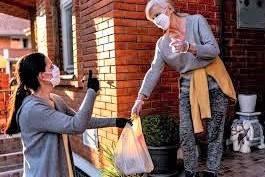Eighteenth Sunday in Ordinary Time
“Take care to guard against all greed … one’s life does not consist of possessions …. For where your treasure is, you heart will be also.” Lk 12:15 & 34
If you knew the world would end one month from today, what would you do right now?
To answer this question, Jesus tells a story about a man so immersed in his possessions that he lost all perspective.
Here’s another story like that – only this one is disguised as humor:
There was a man who was very, very rich. So rich, in fact, that he decides he needs to protect all his wealth in the life hereafter. So he hires a lawyer to bring a lawsuit against heaven.
Heaven, of course, recognizes no lawsuits, but to humor this guy when he appeared at the heavenly gates, St. Peter allowed him to bring one suitcase with him. The guy thinks he’s outsmarted St. Peter, though, because he showed up with a huge “suitcase” – eight feet long, six feet wide and five feet deep.
St. Peter takes one look at it and says: “That’s not a suitcase.”
The guy responds: “You didn’t say anything about size.”
St. Peter rolls his eyes and says, “Well, I still have to open it and see what’s in it.”
St. Peter then opens the trunk and finds hundreds of bars of pure gold. St. Peter then looks at the guy, and with a smirk on his face, says, “You die, and get a chance to bring all your wealth to heaven, and you choose to bring pavement?”
In short, everything the man treasured so dearly ended up amounting to nothing.
That’s also the gist of the story Jesus tells in today’s gospel. He knows that money is important to us … that we need it to house and feed and clothe our family.
But the questions Jesus asks are: How important is our wealth? Is it so central that we allow it to drive the bus of our lives?
Notice the man in today’s gospel shows no concern for any of the peasants who worked the land that brought him all his wealth. Instead the only pronoun that comes out of his mouth is “I”: “I will tear down …. I will store …. I will say to myself.” The rich man doesn’t even recognize that he has become a walled-in human being, the prisoner of a way of thinking that dehumanizes him. He lives only to accumulate and to hoard.
Consequently, he’s able to increase his wealth, but in doing so only impoverishes his own life. He’s able to amass goods, but is incapable of attracting friendships, of generating solidarity with others, of experiencing love.
Sadly, there is way too much of such thinking in the world we live in. 22% of American children live in poverty. 80% of the people on our planet live on less than $10 a day. Schoolteachers’ pay averages $43,000 per year; while numerous professional athletes are paid millions. Median family income in the USA is less than $50,000 per year.
Something’s out of whack – something like a sense of communal sharing.
We all are aware of Jesus’ insistence that, like the case of the rich man in today’s gospel, our lives can take a sudden turn at any moment. For him, it was his death.
But there are many other ways our lives can be dramatically altered: a phone call in the middle of night informing us that someone close to us has been involved in a life-threatening accident; or the unexpected pink slip attached to our paycheck; or a spouse that announces they are leaving a marriage; or any tragedy almost too difficult to bear.
We’ve all experienced something dramatic and terrifying.
So, back to our initial question:
If you knew the world would end one month from today, what would you do right now?
My guess is that you would spend every minute contacting as many people as you could to tell them any or all of three things: “I’m sorry,” “I forgive you,” or “I love you.” Because after all is said and done, it’s our connections with others and with our God that bring us lasting happiness. Nothing else does it.
This is Jesus’ message in today’s gospel story:
Live now what matters forever. Live for what lasts. Live for what will endure.
Or, as Jesus puts it in his last words on this matter:
“Where your treasure is, your heart will be also.”
Ted Wolgamot, Psy.D.
11809194l.1
7/30/19
NOTE: In my “Note” a couple of weeks ago concerning the horrific treatment of people, especially children, at our border, I asked the questions: Where are our bishops? Why are they not gathering at the border and publicly condemning the horror that is being perpetrated by our own government?
I’m happy to announce that at least one bishop finally did. My friend, Joan Ruppman, sent me the statement below by Bishop Mark J. Seitz of El Paso, Texas, delivered on June 27 before he crossed the Lerdo International Bridge that connects the U.S. and Mexico border.
“How do we begin to diagnose the soul of our country?
A government and society which views fleeing children and families as threats; a government which treats children in U.S. custody worse than animals; a government and society who turn their backs on pregnant mothers, babies and families and make them wait in Ciudad Juarez without a thought to the crushing consequences on this challenged city …. This government and this society are not well. We suffer from a life-threatening case of hardening of the heart.
In a day when we prefer to think that prejudice and intolerance are problems of the past, we have found a new acceptable group to treat as less than human, to look down upon and fear. And should they speak another language or are brown or black … well, it is that much more easy to stigmatize them.
Why can’t we put ourselves in their shoes? Because we have decided they are not our neighbors, we have decided that they are aliens and illegals. We think these parents simply have no right to save their children from violence or malnutrition. They have no right to a job or to support their families. They have no right to reunite with family.
For this heart-sick government and society, these people should have stayed home, given into hopelessness and watched helplessly as their children suffer. Would we rather they die on the banks of the Rio Grande than trouble us with their presence?
But we have not suffered the mistreatment meted out to them by those who represent our country. We haven’t really felt their hunger and cold. And it is not our children who will be denied food, water and tenderness tonight.
We Americans need our hearts checked. Out hearts have grown too cold and too hard and that bodes ill for the health of our nation.
In the America of today, is there no more Golden Rule? Have we forgotten the lessons of Scripture? Have we forgotten the commandment to love? Have we forgotten God?
But here on the border, he knocks. In the struggle for hope and freedom and family, he knocks. In the lives of Jakelin and Felipe and Oscar and Valeria, he knocks. In our neighbors here today, he knocks.
He knocks. He knocks. He knocks.”
As happy as I am that, at last, a Catholic bishop is willing to stand up and be counted on behalf of the Gospel of Jesus Christ, I’m left asking yet another question:
Where are the other bishops? Perhaps they should spend some time meditating upon the reminder Jesus offers in today’s Gospel reading:
“Where your treasure is, your heart will be also.”





